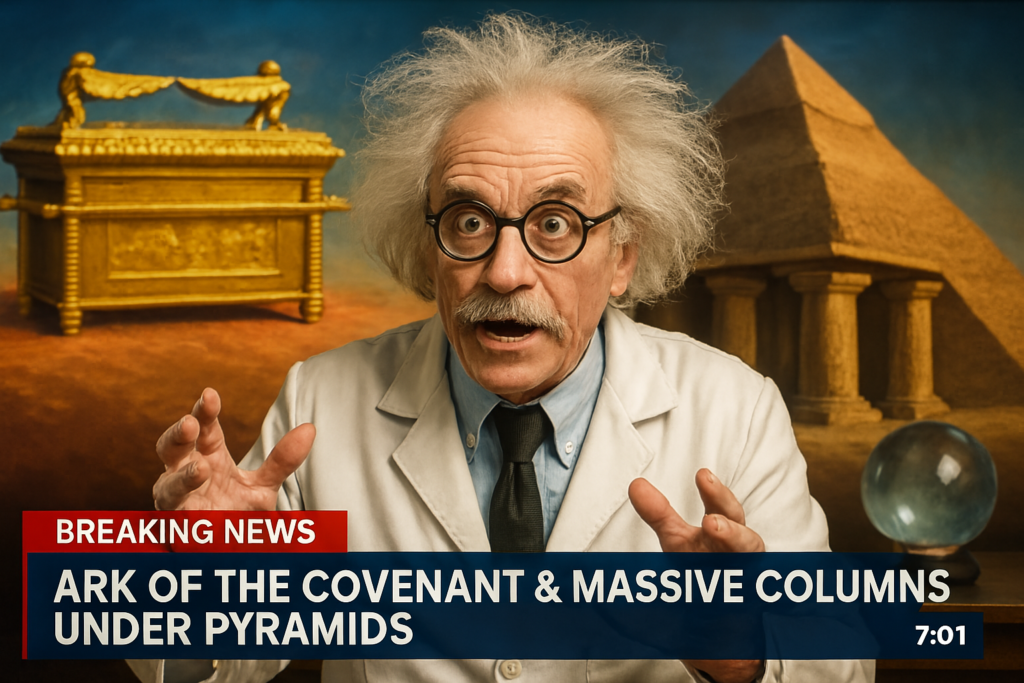Why the Resurgence in Ark-Hunting, Pyramid Mysteries, and Psychic Experiments May be Distractions from the Truth
Not long ago, the Ark of the Covenant suddenly trended on Google—not because of an Indiana Jones sequel, but due to a resurfaced CIA document describing an attempt to locate the Ark using psychic methods, or “remote viewing.” Social media exploded with new theories about hidden relics, forgotten secrets, and supernatural guardians (Deseret News).
This strange episode underscores a broader cultural resurgence of fascination with ancient religious mysteries. From Egyptian pyramids and their supposed hidden chambers to government-backed psychic experiments, occult themes are suddenly mainstream. Netflix’s Ancient Apocalypse, the History Channel’s perennial favorite Ancient Aliens, and Elon Musk’s cryptic tweets about pyramids built by aliens reflect how seamlessly occult speculation blends into popular culture (Business Insider; The Guardian).
However, it may be wise to view this trend critically—not as harmless entertainment, but as prophetic distraction. The current obsession with secret knowledge, psychic phenomena, and occult themes fits neatly into the great controversy between Christ and Satan, becoming a seductive deception cloaked as science or historical inquiry.
The Mainstreaming of the Occult
Paranormal investigations, such as “remote viewing,” once relegated to fringe bookstores now have an aura of official credibility thanks to declassified CIA research into psychic abilities. The CIA’s once-secret “Stargate Project” has given a new veneer of respectability to psychic phenomena, widely shared through popular podcasts, YouTube channels, and viral TikTok theories (The Guardian).
Documentaries like Netflix’s Ancient Apocalypse, hosted by author Graham Hancock, captivate millions despite intense criticism from established archaeologists. Hancock suggests a lost civilization gifted humanity with advanced technology—ideas compelling precisely because they contradict established science (The Guardian).
Podcasts with massive audiences, such as Joe Rogan’s, often host guests who seamlessly blend speculative history and paranormal conjecture. Thus, a new generation engages regularly with occult and mystical topics disguised as edgy scientific inquiry.
Third Temple Fever
Parallel to occult fascination is an increasing enthusiasm for rebuilding Jerusalem’s Third Temple, a notion now voiced openly by influential figures. Fox News personality Pete Hegseth’s recent public statements on the plausibility of a new Jewish Temple exemplify how once-fringe religious theories now enter mainstream political discourse (Times of Israel).
In 2022, news spread of red heifers flown from Texas to Israel, animals essential to ritual purity in a rebuilt temple. Such efforts by groups like the Temple Institute exemplify growing collaboration between Jewish activists and American Christian Zionists, who interpret Third Temple prophecies literally as precursors to the Messiah’s coming (Jerusalem Post).
However, literal Temple expectations dangerously distract from Christ’s present heavenly ministry and promote a counterfeit end-time scenario foretold by prophecy, and Jerusalem-centric beliefs and can distract believers from Christ’s “present truth.”
Spiritualism Rebranded
Spiritualism—a deception combining pseudo-science with occult speculation—is thriving. The occult today wears lab coats and hides behind historical documentaries. Modern spiritualism appears as psychic research, mysticism, and ancient alien theories, all popular precisely because they offer spiritual fulfillment without requiring allegiance to traditional religious truths.
White observed long ago that spiritualism would adapt itself to cultural acceptance by assuming a more respectable guise, even appearing Christian. Today’s resurgence of interest in psychic phenomena and ancient mysteries confirms her insight: contemporary spiritualism is attractive precisely because it promises hidden wisdom, personal empowerment, and universal truths devoid of the demands and claims of Christ (Ellen G. White Estate).
Christ in an Age of Distraction
Ultimately, these cultural fascinations can serve to divert attention from Christ. The Three Angels’ Messages of Revelation 14, emphasize worship of God the Creator, rejecting Babylon’s confusing deceptions, and maintaining steadfastness to Christ. For believers attuned to prophetic awareness, current obsessions with relics, ancient technologies, and psychic secrets underscore a significant cultural moment.
In a world eager for transcendence, the quiet truth at the heart of Biblical eschatology remains steady: real fulfillment lies in Christ alone. The ancient Ark, the pyramids, and psychic secrets promise spectacular enlightenment yet offer shadows instead of the substance found in Jesus. In an age awash in distractions, keeping faith centered on Christ emerges as the most counter-cultural and essential act.
We can see in today’s occult resurgence both a cultural phenomenon and a prophetic alert. Modern spiritualism promises power without accountability, knowledge without humility, spirituality without sacrifice—echoing the ancient lie whispered first in Eden: “You shall be as gods.”
Amidst this era’s captivating deceptions, the simple call remains clear and compelling: “Fix your eyes on Jesus, the author and finisher of our faith.”
Sources:
